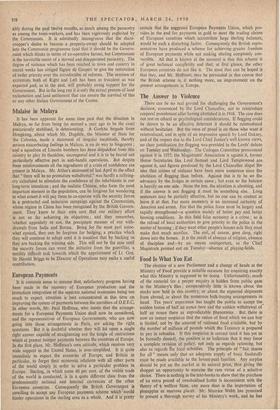European Payments
It is commdn sense to assume that, satisfactory progress having been made in the recovery of European production and the immediate integration of the separate national economies being too much to expect, attention is best concentrated at this time on improving the system of payments between the members of O.E.E.C. In other words, Mr. Paul Hoffman, who insists that the arrange- ments for a European Payments Union shall now be considered, and the representatives of European Governments, who are now going into those arrangements in Paris, are asking the right questions. But it is doubtful whether they will hit upon a single right answer capable of straightening out the tangle of restrictions which at present hamper payments between the countries of Europe. In the first place, Mr. Hoffman's own attitude, which receives very wide support in the United States, is over-simplified. It is quite unrealistic to expect the countries of Europe, and Britain in particular, to forget their economic relations with all other parts of the world simply in order to solve a particular problem in Europe. Sterling, in which some 40 per cent. of the visible trade of the world is conducted, is in a quite different class from the predominantly national and internal currencies of the other European countries. Consequently the British Government is unwilling to accept any European payments scheme which would hinder operations in the sterling area as a whole. And it is pretty certain that the suggested European Payments Union, which pro- vides in the end for payments in gold to meet the trading claims of European countries which accumulate large sterling balances, would be such a disturbing factor. Consequently the British repre- sentatives have produced a scheme for achieving•greater freedom of European payments while not making sterling completely con- vertible. All that is known at the moment is that this scheme is of great technical complexity and that, at first glance, the other European countries do not like it. The most that can be hoped is that they, and Mr. Hoffman, may be persuaded in due course that the British scheme is, if nothing more, an improvement on the present arrangements in Europe.






























































 Previous page
Previous page